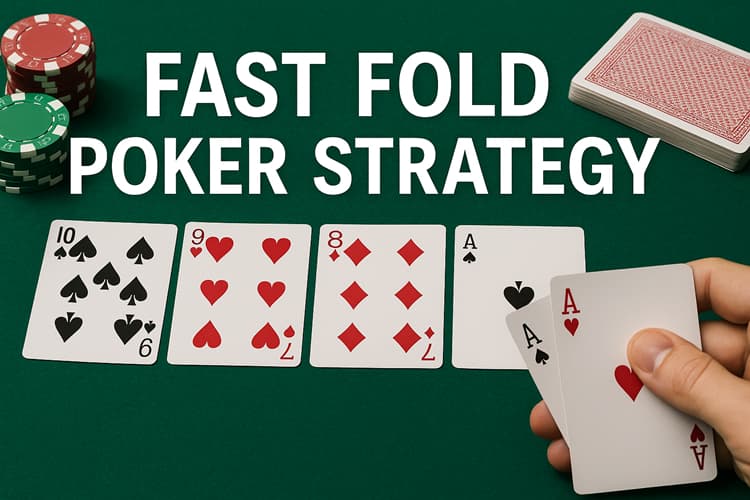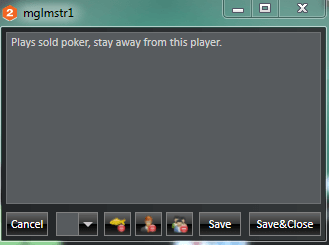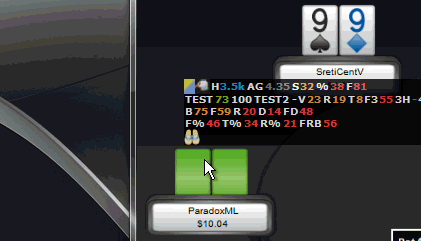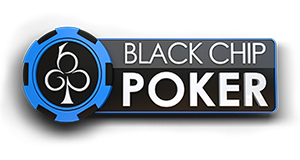When fast fold poker burst onto the scene in 2010, it completely transformed online poker. Suddenly, players could skip the wait-fold a hand and instantly join a new table with fresh opponents.
This innovation made it possible to play up to 250 hands per hour on a single table, or even more by multi-tabling, compared to just 60-100 hands per hour on regular tables.
Because you’re playing so many hands, having a solid rakeback deal is essential to maximize your earnings. While the fundamentals of cash games remain, fast fold poker demands a unique strategy to adapt to the faster pace and player pool.

Table of Contents
What is Fast Fold Poker?
Fast fold poker is the ultimate game-changer for players who crave nonstop action and efficiency. Unlike traditional poker tables, where you’re stuck waiting for hands to play out, fast fold formats let you instantly fold your cards and be whisked away to a new table with fresh opponents.
The moment you hit the fold button, you’re dealt into a new hand at a new table-no more sitting idle or watching others play out hands you’re not involved in. This mechanic is designed to maximize your playing time and keep the adrenaline pumping.
You’ll find fast fold poker under several popular names in the online poker world. PokerStars calls it “Zoom,” while Full Tilt introduced “Rush Poker,” and 888poker offers “Snap Poker.”
No matter the name, the core concept remains the same: play more hands per hour, face a constantly rotating pool of players, and enjoy a dynamic, fast-paced poker experience.
Why is fast fold poker so popular?
- You can play 200-250 hands per hour per table, compared to just 50-60 on a regular table.
- The large player pool means you’re always matched with new opponents, making every hand a fresh challenge
- No waiting for hands to finish-just fold and move on
- Perfect for online poker players who value efficiency, volume, and a constantly changing environment
Fast Fold vs. Regular Cash Games
When deciding between fast fold and regular cash games, understanding the key differences is crucial for maximizing your edge and enjoyment. Here’s a quick comparison to help you choose the format that suits your style:
| Feature | Fast Fold Poker | Regular Cash Games |
|---|---|---|
| Hands per hour | 200-250 per table | 50-60 per table |
| Opponent tracking | Harder, less history | Easier, more reads |
| Multi-tabling | Highly effective | Less efficient |
| Player pool | Large, anonymous | Small, familiar |
| Strategy adjustment | More exploitative, aggressive | More balanced, read-based |
If you thrive on speed, love playing more hands per hour, and enjoy the challenge of a constantly shifting player pool, fast fold poker is your game.
If you prefer a more methodical approach, building reads and exploiting regulars at the table, regular cash games will be more your style.
Either way, understanding these differences is the first step to boosting your winrate and crushing your chosen format.
The 6 Most Important Fast Fold Poker Strategy Concepts
Fast fold poker isn’t just about clicking the fold button faster-it’s about adapting your strategy to the unique dynamics of the game. Here are the core concepts every winning player needs to master:
#1 Volume and Winrate
One of the biggest edges in fast fold poker is the sheer lot of volume you can put in. With hundreds of hands played per hour, your winrate per 100 hands doesn’t need to be sky-high to see solid profits.
Even a modest winrate can translate into significant earnings when multiplied by the massive number of hands played.
Why volume matters:
- Lower winrates are offset by volume: In regular games, you might need a higher winrate to make the same profit you can achieve in fast fold by simply playing more hands.
- Rakeback (RB) becomes crucial: With so much action, you’ll pay more rake-but you’ll also earn more rakeback. Always chase the best RB deals to boost your bottom line.
- Tracking your progress: Focus on your winrate and total hands played, not just short-term results.
Our VIP-Grinders Pro Tip
#2 Know your opponents
Because you won’t have an extensive history with players in Fast Fold Poker games, you will need to quickly identify the fish and make notes.
Did a player do something really dumb, or really good? Is someone playing like an obvious fish, or multi-tabling with large stacks? Note down whom the regulars and fish are, and play appropriately.

It’s also crucial to have an efficient HUD. You will want to set your stats to show the sample size so that you can make good judgments without overly trusting samples that are too small to be reliable.
In separate articles, we have discussed how to use of tracking software and Hold’em Manager 2.

Similarly, because you are playing against a pool of players, it’s important to understand the tendencies of the pool.
Before you have a good read on an opponent, you should play a solid, GTO as a base, making reasonable adjustments to be exploitative against the typical player of the pool.
In general, people will tend to fold easily (since they can just move onto the next hand) and try to make nutted hands (flushes, sets, strong pairs) to stack you.
#3 Player Pool Tendencies
The player pool in fast fold games is usually much larger and more anonymous than in regular tables. This has a big impact on how the games play:
- Regs (regulars): These are the tight, straightforward grinders who make up a significant percentage of players. They’re often risk-averse and stick to solid, ABC poker.
- Nits: The ultra-tight players who fold everything but premium hands. Spotting nits is easier in fast fold because they almost never get out of line.
- Recreational players: These are the fun-seekers (fish) and casuals who play a wider range of hands and make more mistakes.
How to exploit the pool
- Attack the nits: Steal the blinds relentlessly from tight players, especially in late position.
- Identify recreational players: Look for those playing too many hands or making odd bets, and value bet them hard.
- Understand the percentage of players: Most of the pool will be regs or nits, so tailor your strategy to exploit their tendencies.
#4 Adjusted Preflop Strategy
Your preflop approach in fast fold poker should be sharper and more positionally aware than in regular games:
Open wider from late position (BTN, SB): The button (BTN) and small blind (SB) are gold mines for stealing blinds, especially since most players are quick to fold and move on.
3bet and cbet more frequently: Especially against opponents with high fold percentages. Don’t be afraid to apply pressure!
Play tighter from early positions: Since the player pool is larger and more aggressive, stick to strong hands when you’re out of position.
Adjust for stakes: At micro stakes poker (like 10nl or low stakes), players are often more passive, so you can get away with more speculative hands. At mid and higher stakes, tighten up and focus on exploiting regulars.
Avoid limping: Limping is rarely profitable in fast fold-raise or fold, especially with marginal hands.
#5 Postflop Adjustments
Postflop play in fast fold poker is all about exploiting the pool’s “fit-or-fold” mentality:
Cbet smaller and more often: Most players will fold if they miss the flop, so a small continuation bet (cbet) is highly effective.
Fold more often to aggression: Big bluffs are rare in fast fold pools. If you face a big raise or bet, give your opponent credit and move on.
Value bet your strong hands: Focus on extracting maximum value with top pair top kicker, two pairs, and other monster hands.
Don’t get out of line: Avoid fancy plays or big bluffs-exploitative strategy works best by playing straightforward poker.
Protect your stack: Don’t get stacked with marginal hands; save your chips for clear value spots.
Bluff more, fold more
What adjustments should you be making?
Well, remember that people can just insta-fold any hand. That means that people are less likely to stick around with garbage, so you should be tighter with your call-down range and tighter with your 3barrel value range.
Similarly, you should try to find more good spots to bluff, steal and resteal since people will just toss their crap hands into the muck and move on to the next hand. People don’t feel as “married” to their hands in fast-fold.

#6 Understand Your Anonymity
Because many fast-fold poker players don’t have a history with you, the optimal fast fold poker strategy can be different.
You can get away with certain things that you couldn’t against ring-game regulars. Why? Because to most players, you won’t really have an image.
In large pools, the most +EV fast fold poker strategy does not require a perfectly balanced range.
Don’t get me wrong, a solid unexploitable GTO strategy will always make you money. But you’ll always want to be maximally exploitative whenever you can.
If you notice some players are folding all their BBs to steals, then pound them incessantly from the BU and SB.
Because of your relatively anonymity, they will have a harder time changing their defending strategy to counter you.
Since you’ll be stealing with a wider range, your open sizes should be low. Keep it to 2x, or 2.5x. Your 3bet resteal sizes can also be lower at 7x-9x max.
Similarly, Cbet with a wider range and smaller bet-sizing to exploit fit-or-fold opponent’s.
Using Tools: HUDs and Notes
In the fast-paced world of fast fold poker, leveraging technology is essential for gaining an edge. A Heads-Up Display (HUD) and effective note-taking can transform how you approach large player pools and high-volume sessions.
Why Use a HUD in Fast Fold Poker?
A HUD displays real-time stats like VPIP (Voluntarily Put Money in Pot), PFR (Preflop Raise), aggression factor, and fold-to-cbet percentages directly on your table.
These stats help you quickly spot who the nits, fish, and aggressive regulars are-even over small sample sizes.
For example, if a player’s fold-to-flop cbet stat is 60% or higher, you can profitably increase your bluffs on the flop.
If someone has a sky-high VPIP but a low PFR, you’re likely facing a passive fish and should value bet relentlessly.
Fast fold poker is all about volume and speed. When playing multiple tables, a HUD becomes indispensable for keeping track of tendencies without missing key information.
Taking Notes for Exploitative Play
Spotting the Fish and Regulars: Any time you see a player make an unusual play-like calling a raise preflop with J3 offsuit or bluffing with no equity-make a quick note. This info is gold for future exploitative spots.
What to Note: Focus on glaring leaks, such as calling down with weak hands, missing value bets, or showing wild bluffs. Use abbreviations (e.g., “CO 3bs 40bb w/44 vs UTG”) for speed and clarity.
Building a Player Database: Over time, your notes and HUD stats combine to give you a powerful edge, especially when you encounter the same regs or recreational players across sessions.
Caution
Rake, Rakeback, and Bankroll Considerations
Fast fold poker’s turbocharged pace means you’ll pay more rake than in regular games-simply because you’re playing so many more hands. Understanding how rake, rakeback, and bankroll management work together is crucial for long-term profitability.
Rake and Rakeback in Fast Fold Games
Higher Rake Volume: With hundreds of hands played per hour, even a small rake per pot adds up quickly. For example, GGPoker charges 5% rake with caps that vary by stake, and in some fast fold formats, rake is taken preflop from all pots above a certain size.
Rakeback (RB) Is Essential: Rakeback returns a percentage of your paid rake, directly boosting your bottom line. For high-volume grinders, a good rakeback deal can turn a break-even player into a long-term winner.
Contributed rakeback: Paid based on your actual contribution to the pot.
Dealt rakeback: (Rare) Paid based on the number of hands you’re dealt, regardless of your action-great for volume players.
Bankroll Management for Fast Fold Poker
Micro Stakes Poker: For NL2 to NL10, a conservative approach is best. Aim for at least 50 buy-ins to handle variance and downswings.
- NL2: $60
- NL5: $150
- NL10: $300
Low and Mid Stakes: As you move up, keep a buffer of 30–50 buy-ins for cash games. Pros often keep 100 buy-ins for extra security and to absorb variance.
Why So Conservative? Fast fold games can be swingy due to large, tough player pools and the sheer number of hands played. A deep bankroll lets you weather the inevitable downswings without going broke.
Multi-Tabling and Maximizing Volume
One of the biggest advantages of fast fold poker is the ability to multi-table efficiently, allowing you to play more hands and dramatically increase your hourly volume.
However, to truly maximize your edge (and profits), you need to approach multi-tabling with the right strategy and mindset.
Tips for Safely Increasing the Number of Tables
- Start Slow: If you’re new to multi-tabling, begin with two tables and only add more as you get comfortable. Each additional table increases the action and the mental load
- Optimize Your Setup: Use a large monitor or dual screens to keep every table visible. Most poker clients let you tile or cascade tables for easy access
- Use Hotkeys: Most online poker sites offer hotkeys for folding, betting, and raising. Mastering these shortcuts can save precious seconds and reduce misclicks
- Track Your Hands Per Hour: Monitor your hands per hour to ensure you’re actually increasing volume without sacrificing decision quality
How to Maintain Focus and Avoid Autopilot Mistakes
- Quality Over Quantity: Playing more hands is only profitable if you’re making good decisions. If you notice your winrate dropping, consider reducing the number of tables
- Take Breaks: Fast fold poker can be mentally exhausting. Schedule regular breaks to stay sharp and avoid fatigue-induced errors
- Stay Engaged: Avoid distractions like TV or social media while grinding. The more focused you are, the better your results
- Review Sessions: After each session, review key hands where you were unsure or made quick decisions. This helps you identify and correct autopilot mistakes
Our VIP-Grinders Pro Tip
Common Mistakes and How to Avoid Them
Even experienced players can fall into bad habits at the fast fold tables. Here are the most common mistakes that keep players from crushing these games-and how you can avoid them to start beating these games consistently.
Overcalling with Marginal Hands
The Trap: With so many hands flying by, it’s tempting to call down with weak pairs or draws “just to see.”
The Fix: Stay disciplined. Fold marginal hands, especially when facing aggression from tight regulars. Save your chips for high-equity spots.
Not Adjusting to the Pool’s Tightnes
The Trap: Fast fold pools are often filled with nits and tight regs, especially at micro and low stakes.
The Fix: Ramp up your aggression in late position and steal the blinds more often. If the table is full of nits, open wider and cbet frequently.
Ignoring Table Dynamics and Player Tendencies
The Trap: It’s easy to forget you’re playing against real opponents, not just statistics.
The Fix: Use your HUD and notes to spot tendencies. Adjust your style poker to exploit nits, punish loose players, and avoid regulars who fight back.
Playing Too Many Speculative Hands Out of Position
The Trap: Chasing suited connectors and small pairs from early position can quickly drain your stack.
The Fix: Play tight from early positions, especially in fast fold games. Focus on strong hands and attack from late position where you have more information.
Fast Fold Poker in Tournaments
Fast fold poker isn’t just a cash game phenomenon-tournament formats like PokerStars’ Zoom MTTs and similar fast fold games are growing in popularity across the online poker world.
While the core mechanics remain the same (fold and instantly move to a new table), the strategic landscape shifts dramatically when you add tournament dynamics to the mix.
How Strategy Changes in Fast Fold Tournament Formats
In the early levels of a fast fold tournament, you’ll face a massive, rotating player pool. Most players are focused on survival, so the field tends to play tighter than in regular tournaments.
This is a great time to open up your range and accumulate chips by stealing blinds and playing more aggressively from late position.
VIP-Grinders Tip: Take advantage of opponents who are waiting for premium hands. Widen your opening ranges, especially on the button and cutoff, to pick up uncontested pots.
Middle Stages
As the tournament progresses and the average stack shrinks, players begin to loosen up. Blind pressure increases, and you’ll need to adjust by ramping up your aggression, especially in late position.
VIP-Grinders Tip: Look for spots to resteal against late position openers, especially if you have fold equity. Fast fold pools still tend to overfold to aggression, so well-timed shoves can be very profitable.
Bubble and ICM Pressure
The bubble phase in fast fold tournaments is unique: you’re constantly facing new opponents, so you can’t rely on building a tight image. Many players will tighten up to secure a min-cash, which you can exploit by attacking the blinds and short stacks.
ICM (Independent Chip Model) Adjustments: With pay jumps in play, avoid marginal spots against big stacks and focus on pressuring medium and short stacks who are less likely to risk their tournament life.
Final Table Dynamics
Once you reach the final table, the fast fold format usually reverts to a regular table. Now, reads and dynamics become crucial, and you should switch back to a more traditional tournament strategy-paying close attention to stack sizes, payout jumps, and opponent tendencies.
Conclusion
A solid understanding of Fast Fold Poker Strategy will allow you to cash in huge profits. The ability to put in huge amounts of volume means that any player with a decent winrate can earn huge hourly profits.
Because of the volume you’ll be playing, it’s especially important to have an excellent rakeback deal. Luckily for you, we offer the industry’s top deals on partners with some of the best fast fold games on the internet.
FAQs about Fast-Fold Poker
Can I play fast fold poker on mobile devices?
Yes, all major poker sites offering fast fold poker-like PokerStars (Zoom), GGPoker (Rush & Cash), 888poker (Snap), and KKPoker (Flash)-let you play directly on your mobile device through their apps or mobile-optimized sites.
Is fast fold poker available for Omaha or other variants, or just Texas Hold’em?
Fast fold poker is available for both No Limit Hold’em and Pot Limit Omaha on sites like GGPoker, PokerStars, and 888poker. Other variants are rare, but Omaha is widely supported alongside Hold’em.
Is fast fold poker profitable, and can you make a living playing Zoom or similar games?
Yes, fast fold poker can be profitable, especially for skilled, high-volume players. While winrates are often lower than in regular games, the ability to play many more hands and earn rakeback makes it possible to earn steady profits or even make a living if you play enough volume and manage your bankroll well.































